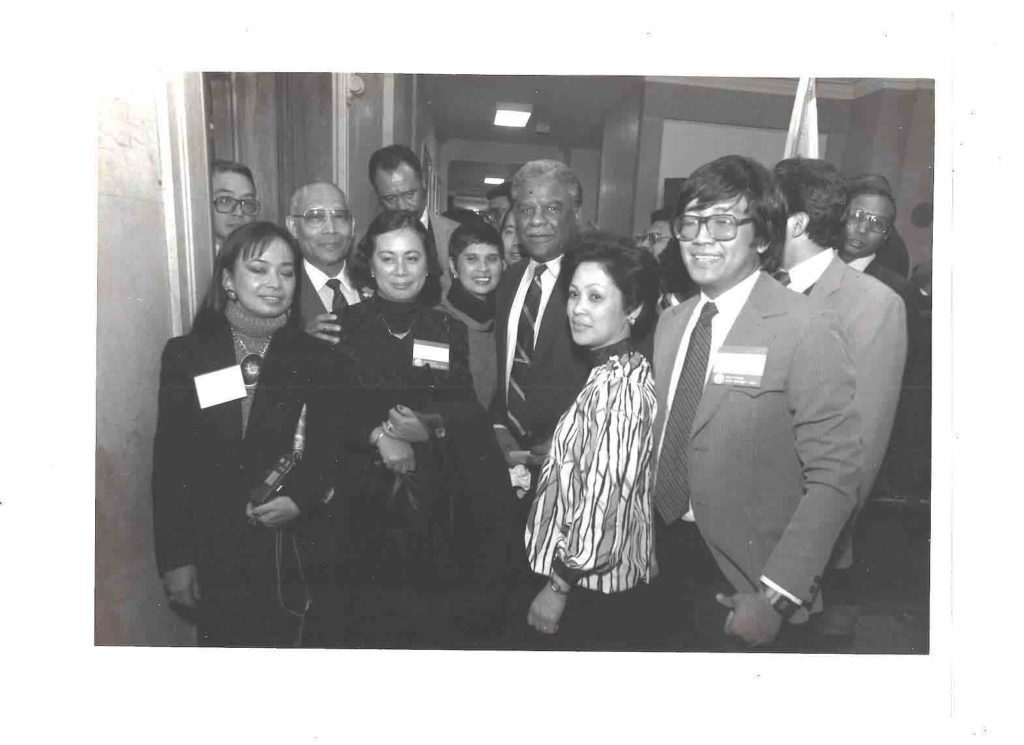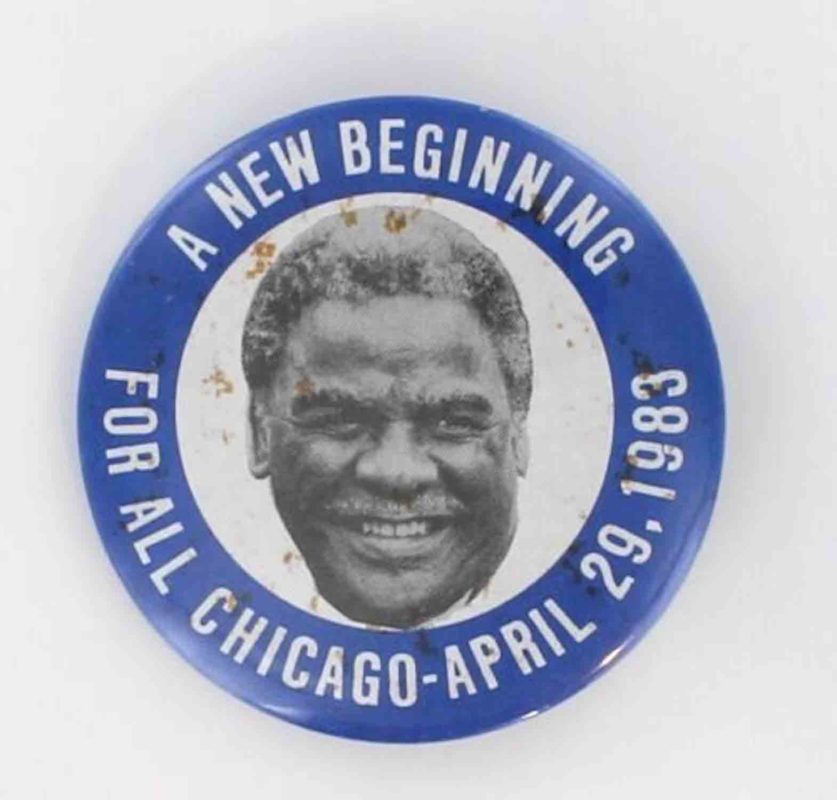2023 Chicago election brings back memories of 40 years ago

Mayor Harold Washington among Filipino American supporters, including this writer Mariano Santos (right) in 1983. PINOY
CHICAGO — Mayoral Primary Election held on Feb. 28 brought back memories of the fateful events of 1983 when Harold Washington became the first African American mayor of the city known as the most segregated in the U.S.
Of the nine contenders in the current contest, seven were Black, including incumbent Mayor Lori Lightfoot, who also made history four years ago by becoming the first Black woman and the first gay to be elected Chicago mayor. (Mayor Rahm Emanuel (2011-19) whom she succeeded is Chicago’s first Jewish mayor.) The Feb. 25 poll showed Lightfoot running second place — with 15.1%. Former Chicago Public School CEO, Paul Vallas, led with 22.7%.
Following them were Cook County Commissioner, Brandon Johnson, with 13.8%, millionaire businessman Willie Nelson with 12 % and U.S. Congressman Jesus “Chuy” Garcia—a Latino-American, running fifth with 11.7%

The late Chicago Mayor Harold Washington’s campaign button, 1983. PINOY
The remaining four candidates were in the single digits with undecided voters at 14%. Vallas—the only Caucasian candidate – secured a slot in the April 4 run-off election. He will face the second highest vote-getter in the primary. [UPDATE: Mayor Lightfoot lost her bid for a second term; Vallas and Johnson will advance to the April runoff.]
Vallas’ early edge
Reports were that no fewer than 180,000 early voters were coming from neighborhoods with large white populations, giving Vallas an early edge to be the next mayor. This was a reversal of the 1983 Democratic Primary when U.S. Congressman Washington got 37%, incumbent Mayor Jane Byrne garnered 33% and State Attorney Richard M. Daley ended with 30%. a
The failure of Blacks this year to rally behind one candidate would be their undoing, just like when then re-electionist Mayor Jane Byrne (she became the first woman to be Chicago Mayor beating incumbent Mayor Michael Bilandic in 1979) and then State Attorney, Richard M. Daley split the white votes—making then U.S. Congressman Harold Washington, the Democratic Party candidate to face the Republican nominee, Bernard Epton in the April 1983 General Elections.
Republicans up to that year never had a serious foothold in Cook County which was tightly controlled by the Daley Machine. GOP candidates would be lucky to get 30% of the ballots cast in all past elections. The first Daley, Richard J., ruled for 21 years—the longest reign until his death in 1976. He made sure the Blacks stayed in their ghetto in the south and far west sides of the city.
Harold Washington was seen as a clear threat to the machine’s control of Chicago politics and of the dominance of the White population.
White politicians rallied behind Epton—it was clear that they preferred a Republican than a Democratic Black Mayor at City Hall. Epton’s campaign jingle was “Before it’s too late!” a dog-whistle with a racist overtone. In the end, Harold prevailed with 51.6 % of the votes to Epton’s 48%.
Various ethnic groups including Latinos and Asian coalesced with Blacks and 8% of White voters to elect the first Black Chicago Mayor. Aroused Blacks led by Rev. Jesse Jackson, registered more than 100,000 new voters—unprecedented at that time.
“Egot”
During that campaign, Mayor Jane Byrne was asked why she did not bother to visit the Rizal Center despite an invitation from some Filipino Americans to do so. She infamously quipped, “Filipinos never bother to register or to vote.” Nonetheless, Fil-Am voters went for either Byrne or Daley.
Many in the community derisively referred to Washington as the “Egot.” The few Pinoys who supported Washington were taunted — “what would happen in your neighborhood and with the price of your houses”–they warned. That’s my personal experience when seen with a blue Washington campaign buttons on my lapel. Mimi Runo was called a “n—-r-lover” by a close family member. It was a sad commentary on the ignorance and the colonial minds of a long-time enslaved people.
We volunteered to be poll watchers for Harold to make sure the Cook County Democratic machine doesn’t produce another Kennedy “miracle.” In 1960 Presidential contest between Vice President Nixon and Senator John Kennedy, then Mayor Daley allegedly “produced” 100,000 additional votes for his fellow Irish-American, making Kennedy the first Catholic U.S. President. He won by 100,000.
Harold Washington was subjected to the most blatant racist intimidation during his term. White aldermen fought him at every turn. The “Council War” earned Chicago the derisive term, “Beirut by the Lake.” (Lebanon was at the midst of civil war in the 1980s) Washington would later successfully rally his coalition to deliver the goods to all Chicagoans. City Hall was opened to various ethnic groups.
Latinos and Asians including Filipinos were appointed to key city positions. Teresita Sagun became the first Filipino-American to serve on a cabinet level. Rudy Urian was a top official at the public works. Juanita Salvador-Burris, a sociologist and fellow resident of the mayor at Hyde Park was hired to work at the mayor’s office. Many served on his advisory boards.
Economic and cultural development of the neighborhood became more equitable. A new City library was started. Minorities started to be engaged in the political processes.
Nervous Daley
I took pride in my involvement in the 1983 campaign of Harold Washington. I was then a graduate student at the University of Illinois in Chicago School of Urban Planning and Policy. My professor on the subject of Economic Development, Robert Meir, assigned our class to do a paper on the subject to be adopted by Candidate Harold Washington as part of his platform.
In a mayoral forum held at the Loop Campus of the DePaul University, I got the privilege to be the backstage usher in-charge of prompting the three mayoral candidates on their respective parts in the program. I got the rare change to engage them in small talks and shake hands with them. I distinctly remember shaking the clammy hand of a nervous Richard Daley. Rob Meir would serve as an economic adviser to Mayor Washington.
Two Eddies
In his 1987 bid for reelection, Washington easily defeated Ed Vrdolyak, one of the two belligerent “Eddies” in the city council, who ran against him in 1987. (Edward Burke was the other one. Both in the recent years were either indicted or convicted for various corrupt practices.). His support of white voters increased from 8% in 1983 to 20% in 1987. His allies in the council also reached the 50% level and with his vote added for a majority, his proposals for the city were finally passed.
Sadly, on the eve of that year’s Thanksgiving Day, Mayor Washington suffered a fatal heart attack while conducting a meeting at City Hall. With my family in tow on Friday evening after his passing, we patiently lined up for up to two hours—joining 200,000 mourners– to pay respects to the late Mayor whose wake was held at the lobby of the City Hall.
Following us at the long winding line at Clark Street was Rev. Jesse Jackson, who obviously did not use his privilege as big supporter of the mayor, to be ushered in as a VIP. At some point, seeing my six-year old daughter Marlyn, struggling to survive the cold, Rev. Jackson offered to carry Marlyn in his arms. A night to remember for our family.
Alderman David Orr who would act an interim mayor—now has the distinction of serving the shortest term—that lasted seven days until the 50 aldermen agreed to make one of them to serve the remaining years of Harold Washington’s second term. Eugene Sawyer became the second Afro American to be Chicago Mayor.
In 1989, Richard M. Daley would make a comeback—defeating Sawyer in the election—and would serve 22 years—surpassing his own Dad’s 21 years—to be known now as the longest serving mayor of the Windy City.
Mariano “Anong” Santos is the Editor/Publisher of PINOY Newsmagazine

